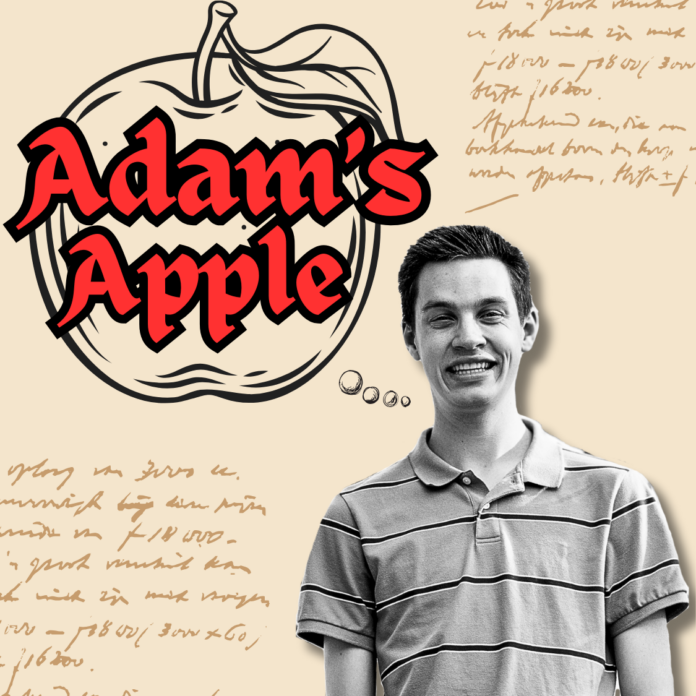Adam Jutt ’25 is a math and economics major from Cincinnati, Ohio who writes articles sometimes. Contact him at adjutt@wm.edu.
The views expressed in this article are the author’s own.
The question for this week is as follows:
“I’m a senior and senioritis is already kicking in, how do I deal with it?”
Right now, you’re probably wondering why there is a comma separating the two independent clauses in that question instead of a semicolon, dash or a comma-conjunction pair. ‘Adam made a punctuation error? But in the past his handle of punctuation conventions had always been impeccable! Sure, his pieces were poorly organized and generally all over the place, but he had always possessed a truly awe-inspiring command of the structural machinery undergirding the English language. I always looked forward to reading his Apple to come face-to-face with bold yet tasteful (also sometimes described as entertaining yet edifying or original yet timeless) applications of the period, comma and their many quirky friends! Without that, why would I read this stuff? Without that, where will I turn?’
Fear not! The grave error was not my decision. You see, that is how the question was submitted. Word for word. Character for character. My first instinct upon reading it was simply to ignore it, because it was likely submitted as a cruel practical joke; someone had likely sent it in on a dare or something, knowing the breaking of such a fundamental and easy-to-get-right rule would make my blood boil. My second instinct, upon reluctantly conceding that beneath the travesty of the prose was a truly valuable question, was to put it in the article with a correction (e.g. semicolon in for comma) imposed. That way I wouldn’t need to waste so much space (this) talking about the small comma-shaped elephant in the room. However, I am a journalist, and I take my job very seriously. To alter the question in any way would be a disgusting overstep, killing the sacred bond of trust that presently connects us all. So, the question is to be left unadulterated.
Instead of viewing that as a regrettable circumstance — a state of being to which we must quietly resign ourselves amid a halfhearted reference to tied hands — I choose to view it as an opportunity. A learning experience for the young man who made the mistake. As you all know, I normally keep the identity of those asking the questions a secret here at Adam’s Apple to promote open dialogue without fear of retribution or embarrassment for the inquisitors. However, in this case I feel that the lesson can be more effectively communicated to the young man if he feels, for lack of a better phrase, called out. Without the pang of shame that accompanies him reading his own name in the next paragraph, without the rush of blood right now preparing its voyage to his cheeks, how could we guarantee that his behavior would change? Without revealing his identity to that majority of my readership whose writing does serve as compelling evidence that they at one point attended a middle school, how will you be able to help me hold him accountable to his sins?
His name is William Eisen, though he goes by the nickname “Will.” Whether he goes by this nickname because he is not able to spell his actual name is something about which we can only speculate. To those who know him, you may be shocked and disappointed to learn about this side of him; isn’t he the brilliant Monroe Scholar applying to chemistry PhD programs? I’m truly sorry to have to break the news of his near illiteracy like this. All I ask is that the next time you see him, you politely but firmly explain that his words have the potential to effect great changes in our society, but only if they are comprehensible.
If you do not know him, know that you know many like him. Maybe it isn’t a clause-separating issue for the Wills in your life so much as a dangling-participle issue. Maybe it is a subject-verb agreement issue. Heck, even I have been known to egregiously split an infinitive now and again. My point is that we all can do more to encourage each other and ourselves to better uphold the grammatical principles which serve as the lifeblood of effective communication. Will simply has more to do than most. Much more.
Lest you think that Will’s habits have no effect on your life, I would like to call to mind a recent troubling trend. When Will came to this campus in the Fall of 2021, the College of William and Mary was somewhere in the 30s on the US News and World Report national universities ranking. After three-plus years of his poor grammar, we are now tied for 54. Is it because he has made us all dumber? Is it because he unknowingly had a conversation with someone on the ranking committee who left said conversation with a poor impression of the College? I don’t know. I’ve taken enough stats to know that technically correlation isn’t causation, but golly gee this one is tough to explain away.
The College has had a strong academic reputation for the last 331 years, and we cannot let Will single-handedly ruin that.

